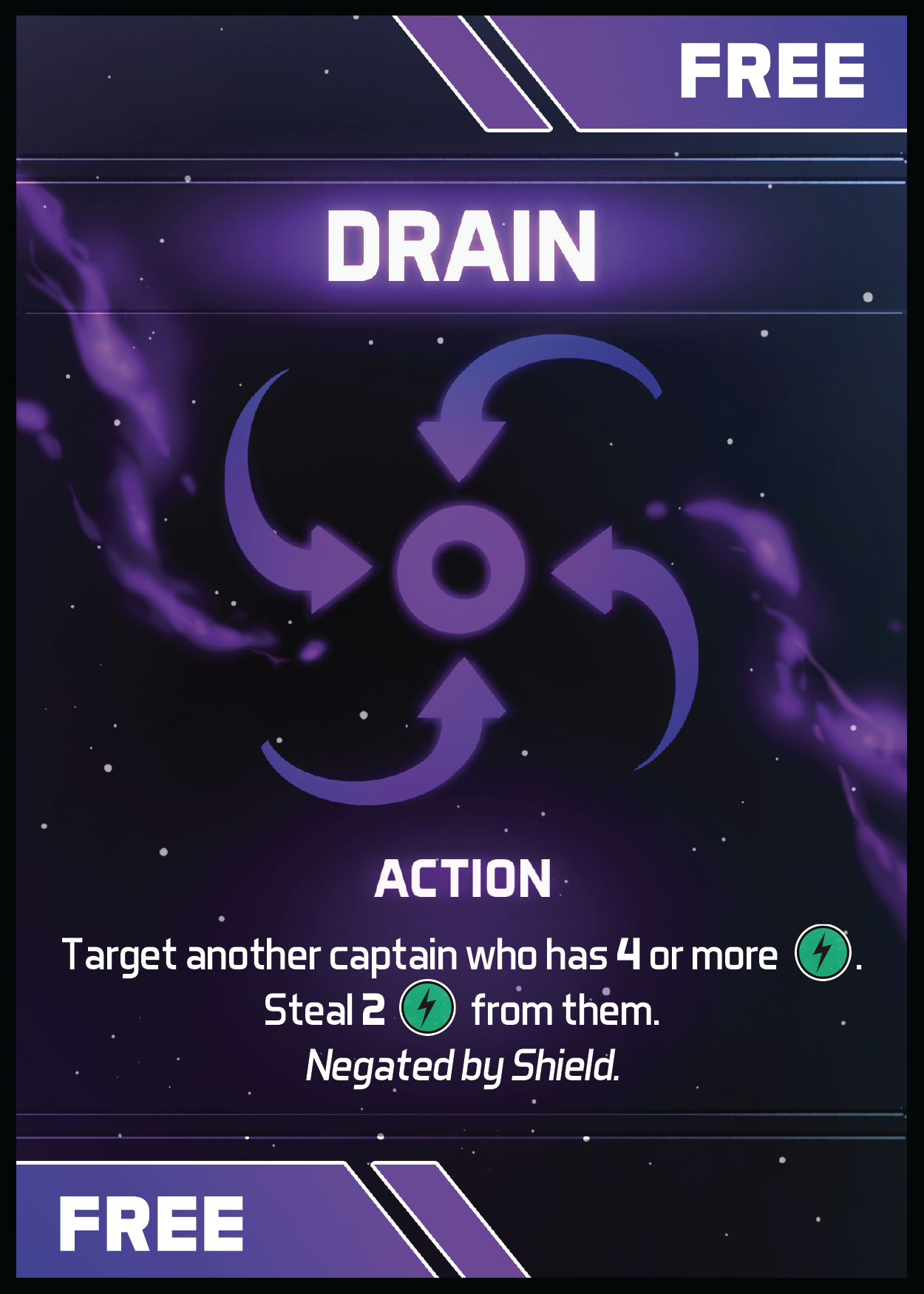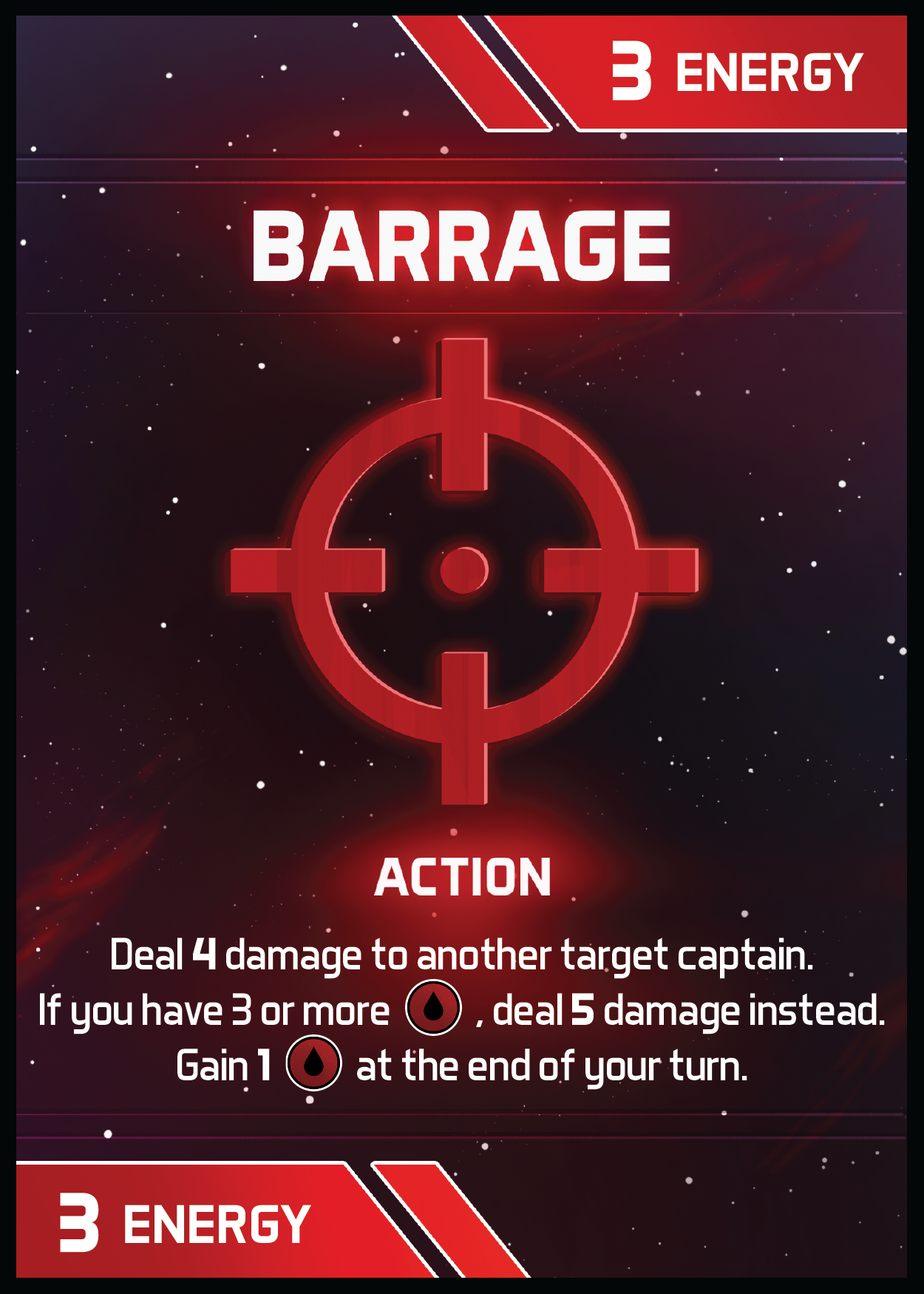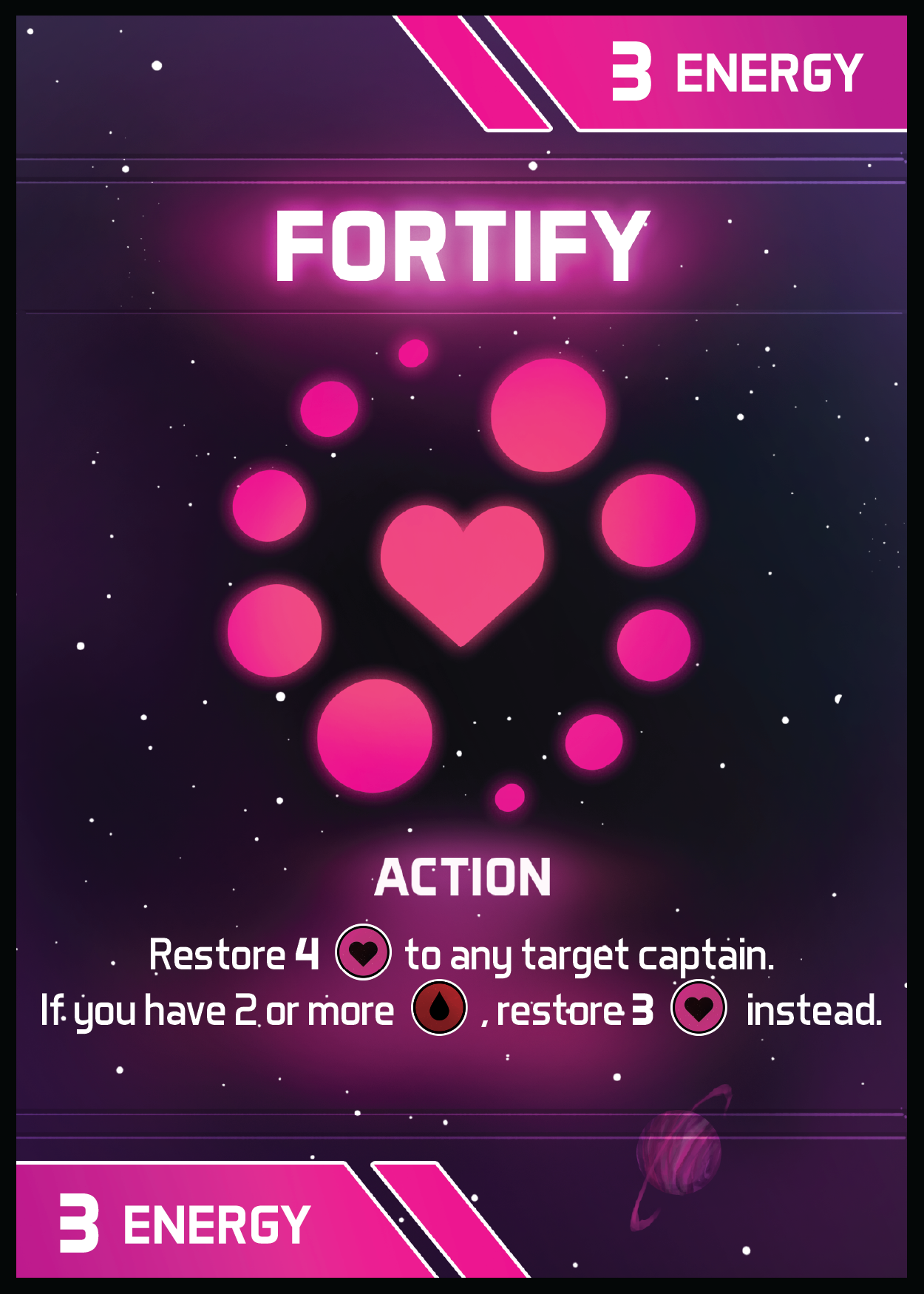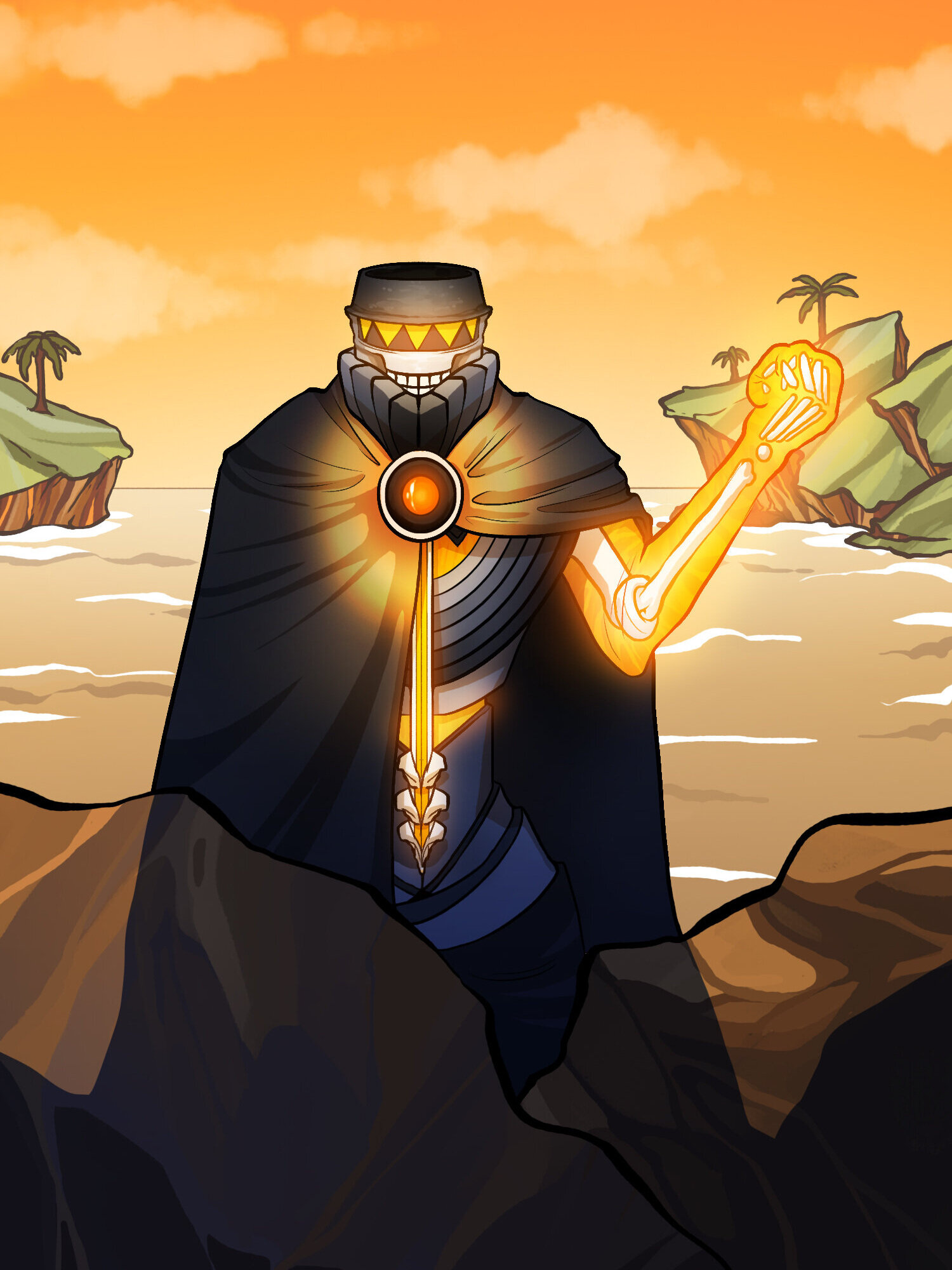I don’t teach most couples how to murder everyone they know, but today is different. This is for the greater good.
In Captain’s Gambit, most victories will cause an immeasurable impact on the galaxy. Prospero might cause a dimensional tear when he warps. Portia will restructure the political landscape of all networking civilizations. Rosalind will Synchronize with powerful and influential lifeforms for her family, and nobody knows what that means. There’s even a rumor that Puck thinks he’s a character and not a “real” person; apparently, Puck wants his “actor” to help him Lucid Dream and collapse reality.
Meanwhile, our two psionic space dragons Romeo and Juliet only want each other. They don’t know the specifics of what will happen when other captains meet their objective, but they know they don’t want to find out. To protect themselves - and each other - Romeo and Juliet plan to outlast this galaxy and all of those who would change it.
Of course, such a plan won’t be easy for these cross-dimensional lovers.
How to Love and Be Loved
If you want to flourish as Romeo and Juliet, you must hone your listening skills. You will encounter many situations where your partner can’t directly articulate their desires: in those situations, it’s up to you to listen and understand their plans. It’s up to you to support your partner when they take action, and help them execute their plans, even if it doesn’t align with what you would do “if that were you”.
However! While you should respect your partner’s strategy, you should also assert some kind of plan or desires of your own. It doesn’t do anything good for your relationship, or your place in the game, if your partner struggles to understand what you are capable of and where your priorities lie.
If you close yourself off from your partner, you leave them to carry the weight of your shared tasks alone. Conversely, communication lets you shore each other’s weaknesses and leverage both of your strengths at the same time.
Okay, so you’re good to listen and talk, but there’s a new problem now: what should you listen for? What should you say?
The Hazards of Love
First, you should know what not to say, and that is anything that advertises your relationship. Just like RJ’s original dilemma onstage, you must navigate the challenge of co-ordinating a difficult goal without anybody noticing that you’re together.
Since you want everyone else dead, most captains must either outrace you or eliminate you entirely if they want a shot at winning. You’re not the only captains who pose that problem of “kill or outrace”, but you two have a weakness that places you higher on the kill-list than other captains: you die if your partner dies, and vice-versa.
This means killing one of you effectively eliminates two for one. While a handful of other captains bind themselves to each other, you two are the only captains with a guaranteed two-way murder option. Opponents can freely attack either of you and safely get a double kill, while other chain-reactions typically only happen if you kill the “correct” captain.
Killing you does two jobs: it eliminates two people who wanted them dead, while also reducing the number of players who might oppose their own objective.
In short, players want you dead - so as RJ, you can’t trust anyone except each other.
Well, then, what should you do? You’re not Richard with his energy schemes, and you’re not Titus with his violent tricks. How can two captains succeed with a glaring double-kill weakness and no powers?
Your bond is the answer.
Broadly speaking, you have three advantages you can leverage to turn the game in your favour. From smallest to largest, these advantages are:
Juliet knows one captain who is not in the game.
Romeo and Juliet know exactly what each other wants.
Romeo and Juliet have substantial influence on the table’s inclinations and allegiances.
In other words, Romeo and Juliet have:
Deception.
Co-ordination.
Social Influence.
Juliet’s Masquerade Advantage
In the original production, Romeo and Juliet met during a masquerade. In Captain’s Gambit, Romeo and Juliet meet right at the end of one such masquerade, where Juliet had just left behind the mask of another captain to greet him.
For a gifted psionic, those masks are far from inconsequential or trivial: when Juliet wears them, they echo with the true memories of whatever captain inspired its form. Even when she meets Romeo, she still carries the imprint of that lost captain’s prime desires.
In plain terms: Juliet players used to be a different captain before Romeo selected them. And Juliet can use this knowledge of her previous identity to her advantage.
As Juliet, if you were an ally captain like Puck, Iago or Rosalind before getting replaced, you can roleplay as those captains to draw attention away from yourself. If you’re careful, you can do this to additionally signal to Romeo which captain is not in the game.
Typically, the drawback of openly declaring that you’re an ally captain like Iago is that the real Iago may call you out on your lies. If you were legitimately Iago before, however, you have 100% certainty that nobody can call you out. You may freely and safely impersonate him.
Upon hearing you claim to be an ally captain, Romeo can then “decide” to ally with you, which will diminish suspicion when you then end up helping each other out across the rounds.
Conversely, if your identity was a potentially-dangerous captain like Prospero, Richard or Titus, you can rest knowing that you need not fear those captains during the game. If you would normally spend energy attacking somebody who “looks like” Prospero or Richard, you may instead focus your efforts elsewhere and know that you won’t accidentally leave yourself open to a surprise loss.
Regardless of who you were before, even a single captain eliminated from your pool gives you a much better estimate of which captains are actually left in the game. This is invaluable when deciding if you’d like to play aggressively or defensively.
This also gives you room to get suspicious, if you see a player claiming to be Iago when you know for a fact they’re not.
Co-Ordination
Strong co-ordination makes powerful results, and RJ do it better than any other. For a point of contrast: have you ever been marked by Cordelia, and found yourself struggling to articulate that you want everybody dead, or that you need 8 energy, without making everyone else want to kill you? Romeo and Juliet don’t have that problem.
Because you know each other’s identity, the two of you can make otherwise risky decisions by leaning on each other as the backup plan. Provided you accurately listen to each other’s hints, you two efficiently chunk away health and take out captains much faster than a lone player could - particularly in situations that are typically countered by the threats of others.
For example, let’s say only 5 of you are alive, and the turn order at the table involves:
You [5 energy] -> ??? [1 e] -> ??? [0 e] -> Romeo [2 e] -> “Iago” (claimed) [5e] ->
And let’s say the player claiming to be Iago has 6 health and the most blood, or maybe even a Loyalty token. For most captains, the idea of taking out that 6-health “Iago'“ doesn’t even exist; attacking them would basically serve Portia / Othello / Brutus / Hamlet / etc a free victory, and there are many shields and other problems that can get in the way as well.
But with the above scenario, the next captain to have any energy for a Barrage or Strike is Romeo. Several layers of uncertainy remain - who has Shield, if the unknown captains will Bribe each other energy, etc - but compared to every other captain, the two of you have a chance to succeed in this situation when the opportunity doesn’t even exist for anyone else.
Going back to the Cordelia example: even if she marked you, you technically don’t know her position at the table, or if she’s even real. Even if she is real, she likely won’t know your win condition - she might Fortify you, for example, instead of finishing off Iago.
Ultimately, as Romeo and Juliet, you have unique options regarding how you remove opponents. Because you know they won’t betray you or steal a win, you have assurance that many other captains cannot have. Even fair Iago faces the danger of getting murdered by Portia at any minute. You and Juliet, though, have a two-way unbreakable bond. You can rest knowing that this player is never going to give you up.
A co-ordination tip: in situations where it would be risky to leave somebody alive, you can work together to ensure that the ideal “persuasion” scenario occurs.
You can stage persuasion attempts where you publicly try to convince your partner that you think a certain captain should die - and you can act relieved and surprised when they “decide” to listen to you. If you’re really smart, you can even stage reverse-persuasions where Romeo/Juliet go “against” your wishes and kill somebody that you “wanted” to spare.
Depending on how well you know your partner, you can orchestrate some hilarious shenanegains. Every Romeo+Juliet pair plays just a bit differently depending on the players behind the wheel, and especially depending on the specific dynamic between you two. But either way, your absolute knowledge and trust for each other let you make roleplays and take risks that other captains normally cannot.
So make use of that trust. Co-ordinate, make fortuitous events happen. Other people might think you just took a gambit that paid off, but you’ll know what you’ve done.
Just make sure nobody else finds out you’re togther.
Social Influence
This is the most subtle advantage but actually the greatest one, if you have the right skills.
We all know at this point how easily humans are influenced by those around them. Peer pressure permeates all social groups in their own ways. (I guess it happens to be useful just often enough for survival that it’s also worth the times when it turns out to be harmful.)
To win, take advantage of your doubled ability to push peer pressure. If you two act like independent agents who happened on a similar conclusion, your influence will stretch far.
For example, you could mention that you’re worried about a Lady Macbeth Reveal, or that you think somebody else is Juliet. If your partner agrees, that can be the push the table needs to change their target. And even one successful round of persuasion is a big deal.
Every round you convince the table to attack others, you two gain massive advantages. Not only do you outsource damage that you’d otherwise need to cause yourself, but you also make other captains spend energy that may have been used against you. Yeah, they’re perhaps moving closer to their own win conditions too, but you outnumber lone captains. You can work together to deny victory when the moment comes.
Generally, the best way to make peer pressure is to capitalize on a third player’s assumptions, provided that they benefit you. If somebody mentions that they think your partner is Brutus, for example, then you can roll with that. Calculate your plans out loud to thwart “Brutus” while your partner acts flustered.
It’s easy to see why joining a third person is so effective for peer pressure at a table of 7-8 players. Imagine you were standing in a room of unknown people, and you were prompted to share an opinion about something controversial, that’d make other people in the room potentially want you dead.
If you shared your controversial thoughts, making at least one enemy, that’s a kind of scary place to be. But then, if two strangers openly agreed with your opinion and welcomed you, how would you feel? It would be pretty hard to think of yourself as wrong, and it’d also be somewhat difficult to suspect these two people are manipulating you. After all, you only voiced your own idea, and they’re just agreeing with you.
In the scenario where a third player declares your partner as Brutus, things may sound bad at first. However, given that most captains like double-kills, you have the opportunity to convince the table to kill Brutus’ mark. You could even volunteer the killing blow yourself to stop “Brutus” from winning the game.
Oh, someone else was Brutus? Oops! ^_^;
That was a specific example, but if you keep your ears open to these kinds of opportunities, you’ll notice plenty of advantageous opinions to pile onto. After all, most of Captain’s Gambit is about sharing opinions regarding who should die, and RJ will say yes to most answers.
So if any third player gets a notion that would be beneficial for you and your partner, take your advantages and allies by stoking those flames. Especially if they get people dead.
The extra benefit of applying group pressure is that contrary opinions become unpopular opinions, which then get stifled. For example, if everyone agrees to kill a player with too much blood, an outcast will have a hard time articulating why it’s a bad idea.
When to Publicly Display Affection
At some point you’ll likely have to speak openly, alerting everyone to your relationship status. This can happen out of necessity, when you must make an obvious play like Shielding or Fortifying your partner before they die. But it can also happen at key strategic moments, when you’ll gain a bigger advantage planning your moves in the open instead of making veiled statements that could be misinterpreted.
Before deciding to drop the act and speak openly to one another, make sure you’re prepared to deal with all the hardships that will come your way. Usually this happens when only two or so captains remain at the table.
Keep in mind that it’s not just a matter of whether or not you & your partner can survive, but also a matter of whether or not you still have room to convince the remaining captains to kill each other. Giving away your identity guarantees that all the remaining damage must be dealt by you two, which can sometimes be difficult (or even impossible) if you reveal your connection too soon.
Mathing Out Murder
Don’t let yourself get tunnel vision about Barrage. You need to be flexible and co-ordinated to reach your goal, since simple attacks seldom suffice. Ways to take out captains include:
Strikes.
Barrages.
Bluff damage.
Persuaded Strike/Barrages.
Loss conditions.
Chain-reaction deaths.
Damaging Reveal effects.
The effectiveness of your damage-dealing methods scale directly with their risk. Strike represents 2 damage with little risk of making you lose, but it actually costs a lot:
3 energy (and a turn or two to get it back)
1 turn out of 12 (or 24, if you count you two as a team).
The support of the person you’re attacking
The connotations of having blood (looking like Lady Macbeth, worse Fortifies, etc)
Conversely, the high-risk option of goading a chain-reaction death is pretty much free, if you can successfuly persuade people to kill the right person. However, it’s tough to pinpoint which deaths will actually cause a chain reaction, and it’s also difficult to recognize if a certain captain will directly win the game by delivering that final blow.
The highest-risk thing you can do is encourage harmful Reveal effects from the likes of Titus or Richard III. It’s extremely unlikely you’ll ever survive these things, but technically they can do all the work for you and leave you three in a final brawl in a few extraordinary cases.
The reasonable approach, though, is primarily persuading other players to attack each other - and offering to help.
You also want to encourage bluff calls when you can, since the net health at the table will drop regardless of who wins the call.
And of course, you want to lob plenty of Barrages when possible, and look for clever ways to make captains lose.
I recently played a game where Puck and Prospero teamed up for a round 12 victory while leaving an unknown third captain out in the cold. Unfortunately for Prospero, Puck drained him on round 11 instead of giving him two energy.
This made Prospero lose on his round 11 turn, while Puck (who was actually Juliet) took the victory with Romeo. I couldn’t believe it.
How to use each permit
Overcharge
Overcharge is a fine permit for all captains, and you’re no exception. As Domination captains with no destructive abilities, you must make the most of every turn to ensure people die.
However, keep in mind that you two don’t need to kill everyone alone - it’s always more efficient to apply your peer pressure advantage. Convince captains to kill each other when you can.
Drain
Drain gets you that ever-useful energy, and also protects you and your partner from at least one attack eventually. However, it’s less useful to drain away energy from a captain if they were already set on attacking someone else.
First, that makes you enemies with the person you drained, and then it also makes enemies with whoever you attack with your stolen energy. Maybe let other captains keep their energy and fight each other instead.
But you don’t have to just drain enemies - you might think it funny to Drain 2 energy from your partner, and you’re right. It’s extremely inefficient, but it has the advantage of providing social cover and making the two of you look unrelated - or even antagonistic - at little cost. After all, if your partner really wants to keep their energy, they could just declare Shield, making a little hint to you that they have some good uses for that energy (like a Barrage).
Barrage
You need to be the last two captains to win, and Barrage is twice as efficient as Strike on the “murder” front. While it’s once again important to remember that mathematically the two of you are unlikely to kill everyone else without charming other players, you’ll definitely have a better time if one of you can get your hands on a Barrage.
Luckily, there are four permits between the two of you, so it’s twice as easy for Romeo and Juliet to get a genuine Barrage than other captains.
Keep an eye out if your partner never seems to finish off anybody with a Barrage - typically, dying opponents are more likely to call a Barrage bluff if they’re about to die (unless they have the energy for a Shield), so that might be your hint that your partner is bluffing. You two might need to work together to take down an opponent with Strikes if this looks like the case.
Fortify
Take responsibility for your health, for your own sake as well as your partner’s. After all, both of you lose if either of you die. Self-care is a necessity for a healthy relationship, and Fortify can do a fine job on that front.
Generally, self-Fortifies draw less suspicion than Fortifying other captains, so taking care of yourself and freeing your partner to focus on other tasks leads to better output between both of you.
Once the masks come off, or in dire situations, of course you’ll have to eventually Fortify each other. I’ve seen some strategies where one captain keeps low blood for better Fortifies while the other captain keeps high blood for stronger Barrages. Seems fun to try at least.
Network
Network is a funny permit for Romeo and Juliet. While the two of you can’t share your permits, by Networking you can get a better idea of what your partner might be comfortable - or not comfortable - bluffing over the course of the game.
For example, if you’re holding a Barrage and you draw one or two more, that’s your sign that your partner will likely be uncomfortable Barraging somebody to death.
And, if your partner continuously Networks, that’s your signal they probably don’t have that coveted Barrage. Both of you will then need to swap gears into violence-encouragment mode and look for other ways to efficiently eliminate captains from the game.
Shield
Shield stops yourself and your partner from dying, and it stops drains. There’s not much special to say on this front. Use Shield when you need to deny an assassin the killing blow, or when you want to save your partner from death in a general sense.
Just keep in mind that Shields are always less energy-efficient than Fortifies, in exchange for having the element of surprise. If you’re not foiling somebody’s plan, you’re not really making the most of this permit, because you could instead just Fortify a few turns later (or even just Shield on the next turn).
There is one simple tactic you can do with Shield: If you’re unsure if the game will end from a certain attack, you can shield the killing blow and let “Someone Else” (your partner) finish off that captain instead. This lets you prevent potential assassins from winning, and also keeps suspicions low about yourself, because you’re not even the one getting the killing blow.
Cosmic Love
Romeo and Juliet are tough to play. Together, you must accomplish one of the most difficult tasks in Captain’s Gambit. And if you even hint that you care about each other, some heartless Captain will murder you or your partner before you can react.
To stand a chance, you can’t just Barrage every opponent you see. Instead, to win as Romeo and Juliet, take care of yourselves and each other.
Use your double-presence to deceive other captains about your identities, to co-ordinate deadly and secure attacks, and to shift the social landscape to your advantage. Use your doubled action economy, your doubled permit spread and your doubled energy gain to overwhelm your opponents over time. Your shared goal and your secret knowledge makes your bond stronger than any other pair of characters in Captain’s Gambit.
Look out for each other.
Looking for companionship? Our Discord isn’t the place for romance, but it’s a great place for friends. Play some games on Tabletop Simulator or just hang out with us here.































